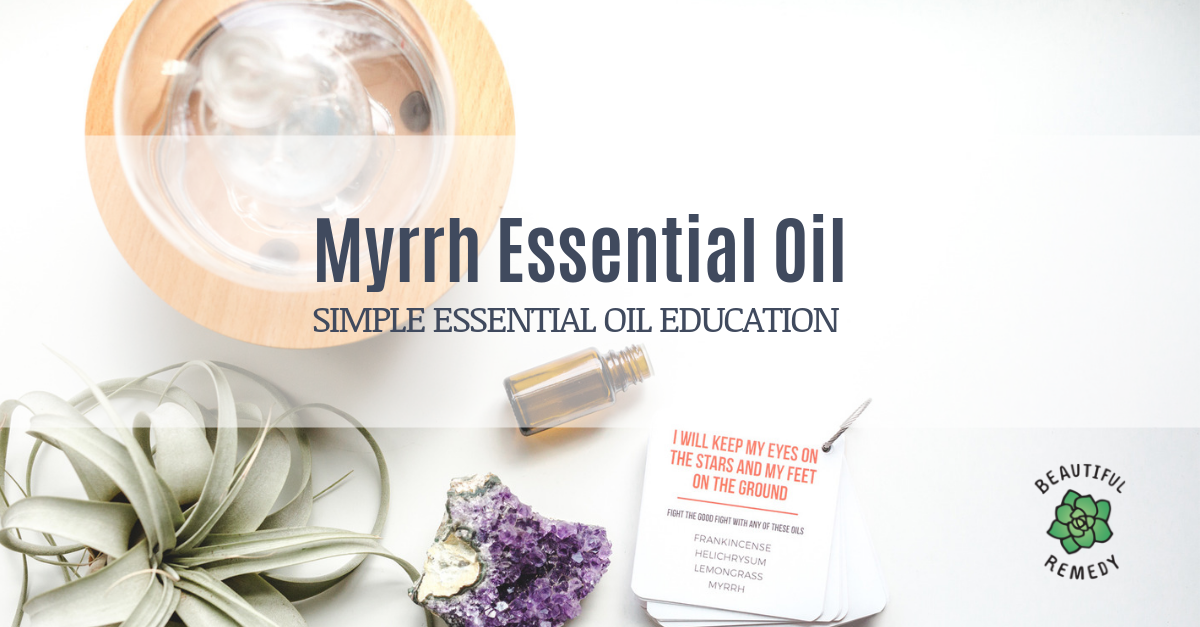The healing & nurturing oil
What is Myrrh oil?
There was a good reason that Myrrh was brought as one of the gifts from the Magi to baby Jesus. In ancient times, Myrrh was an anointing oil and a valuable item that was a standard gift to honor a king or deity.
Myrrh is a resin, or sap-like substance, that comes from a tree called Commiphora myrrha. It’s origin is located in the Middle East. Myrrh is botanically related to Frankincense, and is one of the most widely used essential oils in the world.
Myrrh is harvested by cutting the tree trunk to release the resin which drains from the tree and is left to dry. The dried resin is then scraped off and steam distilled to extract the oil.
How should I use Myrrh oil?
Apply topically, diffuse or take internally.
(I suggest diluting myrrh with your favorite carrier oil before topical use.)
- For skin rejuvenation and fine lines, apply it topically every night. You can mix a drop right into your moisturizer.
- To improve thyroid health and immune support, apply over thyroid and the bottoms of your feet.
- Apply directly over an area to help heal wounds and skin issues like dry skin and eczema. This is a great oil to help heal infections. I use it frequently to help heal cracked cuticles. It works like magic!
- For occasional stress and anxiety, apply to reflex points or diffuse to help calm and promote emotional balance. (see below for great oils to blend with it in the diffuser.)
- For congestion and mucus, apply over the chest or diffuse to help dry up congestion and clear airways.
- For infections & virus, take internally in an empty capsule or apply on the bottoms of the feet. *only take 1-2 drops at a time internally.
Complimentary oils
Myrrh blends well with these oils: frankincense, sandalwood & lavender.
Cool facts about Myrrh
Myrrh is most commonly known as one of the gifts the three Wise Men brought to Jesus in the Bible. It was also presented at his death to be used prior to burial.
The word “myrrh” comes from “murr,” which means “bitter” in Arabic probably because of the resin’s bitter taste.
Important to know…
According to Dr. Mercola, Myrrh oil is not recommended for pregnant women and nursing moms, as it can induce menstruation and lead to premature labor. Children age six and below should also refrain from using this oil. Diabetics and other people suffering from health conditions should also consult their physician before using myrrh oil.
*These statements have not been evaluated by the FDA. This product is not intended to diagnose, treat, cure or prevent any disease.
Posts may contain affiliate links. If you purchase a product through an affiliate link, your costs will be the same but Beautiful Remedy will receive a small commission. This helps cover some of the costs for this site. We appreciate your support!


I’m glad you mentioned that it works well to blend myrrh oil with others such as frankincense and lavender. I want to get some myrrh oil to diffuse in my home because I’ve heard it can help ease anxiety and promote good emotional health. Thanks for sharing these tips I can use to create a relaxing and enjoyable blend of essential oils to diffuse!
Thank you for the information. What is the best blend for wound care?
Hi Shirley, Thanks for your comment. Check out this skin support blend, it’s our favorite for wound care! https://www.beautifulremedy.com/skin-support-blend/